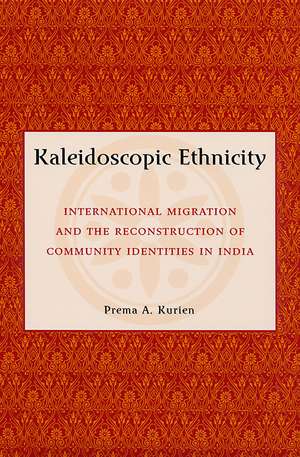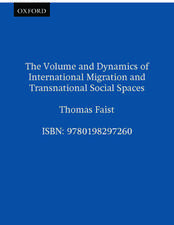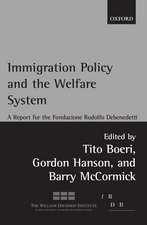Kaleidoscopic Ethnicity: International Migration and the Reconstruction of Community Identities in India
Autor Prema A. Kurienen Limba Engleză Hardback – 7 aug 2002
Co-Winner of the 2003 American Sociological Association's Asia/Asian American book award.
Based on ethnographic research in three communities (Ezhava Hindu, Mappila Muslim, and Syrian Christian) in Kerala, India, which sent large numbers of workers to the Middle East for temporary jobs, Kaleidoscopic Ethnicity explores the factors responsible for the striking differences in the groups’ patterns of migration and migration-induced social change. Most broadly, Prema Kurien seeks to understand what ethnicity is and how it affects people’s activities and decisions. She argues that, in each case, a community-specific nexus of religion, gender, and status shaped migration, and was, in turn, transformed by it.
The religious background of the three groups determined their social location within colonial and postcolonial Kerala. This social location in turn affected their occupational profiles, family structures, and social networks, as well as their conceptions of gender and honor, and thus was fundamental in shaping migration patterns. The rapid enrichment brought about by international migration resulted in a reinterpretation of religious identity and practice which was manifested by changes in patterns of gendered behavior and status in each of the three communities. What makes this book unique is its focus on the sociocultural patterns of short-term international migration and its comparative ethnographic approach.
Based on ethnographic research in three communities (Ezhava Hindu, Mappila Muslim, and Syrian Christian) in Kerala, India, which sent large numbers of workers to the Middle East for temporary jobs, Kaleidoscopic Ethnicity explores the factors responsible for the striking differences in the groups’ patterns of migration and migration-induced social change. Most broadly, Prema Kurien seeks to understand what ethnicity is and how it affects people’s activities and decisions. She argues that, in each case, a community-specific nexus of religion, gender, and status shaped migration, and was, in turn, transformed by it.
The religious background of the three groups determined their social location within colonial and postcolonial Kerala. This social location in turn affected their occupational profiles, family structures, and social networks, as well as their conceptions of gender and honor, and thus was fundamental in shaping migration patterns. The rapid enrichment brought about by international migration resulted in a reinterpretation of religious identity and practice which was manifested by changes in patterns of gendered behavior and status in each of the three communities. What makes this book unique is its focus on the sociocultural patterns of short-term international migration and its comparative ethnographic approach.
Preț: 540.66 lei
Nou
Puncte Express: 811
Preț estimativ în valută:
103.46€ • 106.73$ • 86.33£
103.46€ • 106.73$ • 86.33£
Carte tipărită la comandă
Livrare economică 26 martie-09 aprilie
Preluare comenzi: 021 569.72.76
Specificații
ISBN-13: 9780813530895
ISBN-10: 081353089X
Pagini: 332
Dimensiuni: 152 x 229 x 20 mm
Greutate: 0.45 kg
Ediția:None
Editura: Rutgers University Press
Colecția Rutgers University Press
ISBN-10: 081353089X
Pagini: 332
Dimensiuni: 152 x 229 x 20 mm
Greutate: 0.45 kg
Ediția:None
Editura: Rutgers University Press
Colecția Rutgers University Press
Notă biografică
Prema A. Kurien is assistant professor of sociology at the University of Southern California and a research associate for the Project on Religion and the New Immigrants in Los Angeles, at the University of Southern California's Center for Religion and Civic Culture.
Cuprins
Preface and Acknowledgments
1. Ethnicity and International Migration
2. The Kaleidoscope of Ethnicity: Religion, Status, and Gender
3. Colonialism and Ethnogenesis
4. The Middle Eastern Migration from Kerala
5. Ethnicity and Migration in Veni: Strengthening Solidarity and the Joint Family
6. Ethnicity and Migration in Cherur: The Decastification of Status
7. Ethnicity and Migration in Kembu: Strengthening the Nuclear Family and Women
8. The Ethnic Kaleidoscope and International Migration Revisited
Notes
Glossary
References
Index
1. Ethnicity and International Migration
2. The Kaleidoscope of Ethnicity: Religion, Status, and Gender
3. Colonialism and Ethnogenesis
4. The Middle Eastern Migration from Kerala
5. Ethnicity and Migration in Veni: Strengthening Solidarity and the Joint Family
6. Ethnicity and Migration in Cherur: The Decastification of Status
7. Ethnicity and Migration in Kembu: Strengthening the Nuclear Family and Women
8. The Ethnic Kaleidoscope and International Migration Revisited
Notes
Glossary
References
Index
Descriere
Based on ethnographic research in three ethno-religious communities (Ezhava Hindu, Mappila Muslim, and Syrian Christian) in Kerala, India, which sent large numbers of workers to the Middle East for temporary jobs, Kaleidoscopic Ethnicity explores the factors responsible for the striking differences in the groups' patterns of migration and migration-induced social change.










